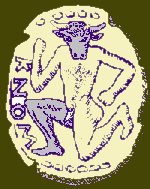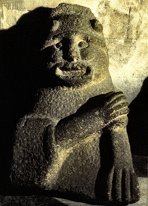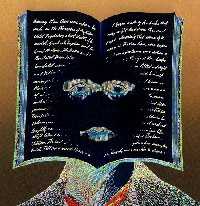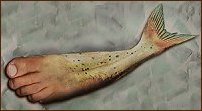|
TWO SHORT STORIES by S.J. SIMMS
1. JUST DESSERTS He had never killed a woman before, indeed he thought of himself as a pacifist. His mother had always described him as someone who wouldn't harm a fly but that was an exaggeration. He had killed many flies in his lifetime as well as a considerable number of wasps, mosquitoes and even a bee which had distracted him earlier this morning as he sat in his deckchair reading the Times. It was best to think things through. To botch a task like this would be unforgivable. He did not want to cause her unnecessary pain. Death must be swift and apposite. He would kill her with kindness. He closed his eyes for a moment savouring the sheer beauty of the plan which was forming in his mind. They had been brought together six months ago by well meaning friends who thought it was time that he married and settled down. Andrew and Francis Percival had insisted that he and Pamela were destined to be soul-mates. Both were meticulous in their habits, both worked in administration, both had looked after elderly parents until their deaths and were now comfortably provided for with their own homes and financial security. Pamela was a few years older than Malcolm, she admitted to forty-five but he suspected that she was nearer fifty, he was forty three. Marriage had been
unthinkable before his mother's death. She would not have
been able to manage without him. She was so trusting and so
naive; believing everybody and everything no matter how many
times he warned her about the dangers inherent in her position
as a widow-woman of private means. His father had cosseted her
until he died unexpectedly of a heart attack in the arms of
a woman who claimed to be a passer-by but who knew a surprising
amount about the family. He had resolved to continue his father's
task. Until his mother passed away he devoted himself to her
protection. As an only son it was the least he could do. The therapist,
an ungainly woman with bad breath, had told him that he was
a control freak. He thought at the time that it was a very unscientific
diagnosis. His compulsions were a necessary part of his life.
Without them there would be chaos. ‘Hello Malcolm.' The two words conveyed the hysterical desperation she exuded - a middle aged woman trying to look and to sound like a young girl. ‘I was making shortbread and I thought I would bring some over for your morning coffee. Do you mind if I join you.' Malcolm watched through narrowed eyes as she flapped her hat at him and laid the biscuit tin on the garden table beside his deckchair. He leant over and with the tip of two fingers moved it in line with the edge of the table, then centred it more precisely. The embossed gold and green tin lay on the marble surface of the table like a cockroach. The beauty of the garden was defiled. He sighed and stood up. ‘Pamela,
how kind. I adore home made biscuits.' He squeezed her
arm rather more tightly than he had meant to as he guided her
towards the other chair. Pamela struggled
to free herself. ‘Let me help. I'll carry the tray.' She held her hat
over her eyes to shade them from the glare of the mid-morning
sun. Her skin looked pale and blotchy like frogspawn. He smiled
benignly. Malcolm put two tall glasses into the fridge and took a bottle of Gordon's Gin from the bottom shelf of the drinks cabinet. He took a blue Magnesia bottle from the top shelf of his larder cupboard and using a silver medicine spoon put two spoonfuls of distilled monkshood into one of the chilled glasses. The Angostura Bitters would cover the sour taste. Next he uncorked the gin and half filled both glasses, topping them up with ice cubes. He added a sprig of fresh mint to his own and floated a twist of lemon peel and a sprig of mint in hers. It was an aberration to treat good gin like this, but needs must. He placed an oval Beleek dish, one of his mother's favourites, on the tray. Pamela half rose
from her seat as he put her drink beside her. She prised the
lid from the biscuit tin and held it out. He selected four sugar
dusted shortbread fingers and arranged them on the dish. ‘I'm so thirsty.' Pamela half emptied her glass as he stretched for a biscuit and bit into it. Surprisingly, it was delicious - sweet and buttery with a hint of cinnamon. She waved him towards the others and he selected a second one. As he swallowed the last crumb of his third biscuit a profound lassitude stole over him. His legs felt numb and fidgety but he could not move them. His arms hung uselessly at his sides and a trickle of saliva made a gelatinous trail from the corner of his mouth, down his chin and on to his shirt collar. Pamela leant towards
him and whispered in a voice hoarse with excitement, Abruptly she put her hand to her mouth and a stream of vomit gushed between her fingers and over the table, splattering mother's china dish. Malcolm had never felt more helpless nor more fully conscious. Of course, he
thought, struggling vainly to respond to the tide of fevered
revulsion gleaming in her watery grey eyes.
2. THUS SPAKE ARETHUSA If she hadn't been a regular listener to Thought for the Day it might never have happened. When the programme initiated an exploration of alternative ideologies Arethusa was gripped by religious fervour. We weren't surprised. We were shocked but, when we thought it over, we weren't at all surprised. Over the years we had become accustomed to Arethusa's enthusiasms. There had been the food fads, no meat, no carbohydrates, nothing that wasn't organic and nothing that had been transported for more than twenty miles - that was the most difficult. The countryside should be full of local produce, and it is, but unless you are prepared to shoot it, slaughter it with your bare hands or grow it, it is not readily available. Home produce does not appear on the shelves of our local shops. They are filled with vegetables flown in from Spain, fruit grown in Israel, exotics from Zambia. You would have to creep into a field at dawn and wrestle a sheep for a home grown turnip. There are nettles of course and apples and blackberries in season, but they make precious little contribution towards a healthy diet. Arethusa's food fads faded as quickly as they appeared but she had been a collector for more than half a century. That was a consistent trait. We didn't notice for some time how narrow her field of interest had become. The gaudily painted icons fitted in with her decorative schemes. The pitch pine organ stool was sturdy and practical as a TV stand. It was when she started to accumulate larger church furnishings, several heavy mahogany pews, two carved pillars and some altar rails from a disused Parish Church, silk lined tabernacles and finally a full size crucifix, that we became uneasy. She was nothing if not ecumenical - Baptist, Catholic, Church of Ireland. There were exquisite prayer mats from Jordan and an embroidered screen from the Yemen. In pride of place at the centre of her collection stood a flaking gilded Buddha. She had been smitten by religion. Exactly which religion she had been smitten by was not yet apparent. The hut stood in a clearing in her overgrown garden. It was a nondescript building used mainly to store garden furniture. When she began to incorporate her religious artefacts into it that first spring we were amused by the ingenuity she showed in creating an original garden feature from what had been something of an eyesore. The carved pillars were fixed to the veranda, the altar rails were strung between them and the crucifix hung at the apex of the pitched roof. This had to be removed as the Saviour's feet caused head injuries to anyone entering without genuflecting. She put the cross on the wall facing the door and replaced it with a monstrous set of antlers mounted on a rough wooden facsimile of a stag's head. Lifelike plastic decoy pigeons roosted on the branched horns. A Buddha sat slightly to one side of the cross and an iridescent Vishnu sat on the other. The floor was heaped with camel bags, prayer rugs and lushly decorated velvet cushions, the walls hung with embroidered cloth and mandalas, copied from designs she found on Wikipedia. We agreed, with the benefit of hindsight, that it was the reliquaries which pushed her over the edge. She sourced the first - purported to be St Bridget's fingernail - this was no mere clipping - it was a complete fingernail with shards of desiccated flesh adhering to it, from e bay. Next came the filigree box containing the knuckle of St Patrick. It was when she produced the scrotal sac of St Jerome that we began to doubt her sanity. For a time she was happy arranging and classifying these testaments to holiness but when she discovered how common body parts of the saints were on the World Wide Web she became disillusioned. She proposed a forty day retreat to her temple, as she now referred to the hut. She returned to the house at night. It was too cold and uncomfortable to sleep in a draughty shed and the lack of toilet facilities, except for the Royal Doulton chamber pot she kept in one of the tabernacles for emergencies, was daunting to a woman in her early seventies. When she emerged, in early May, she was radiant. Her religious experience had borne fruit. Like many great spiritual leaders she was to write a book - a book of aphorisms - to meld all previous religious beliefs into a systemic pattern for living in the new millennium. The threads of faith, the definitive philosophies, the solutions to life in the twenty-first century were to be formulated, digested, indexed, with footnotes, appendices, and commentaries, and proclaimed from the temple of Arethusa, Oracle of Tullycrackin. It was to be her life's work. Of course at seventy-six it would be a fairly rushed life's work. But Arethusa was confident that her experience, her sensibility, her finely honed instincts and the certainty that she had found her vocation, would lead to success. This was not to be one of those religions which evolves from humble beginnings and years of contemplation and sacrifice. This religion would burst on the world, indeed the universe, if space travel took off as it was forecast to do; it would blaze a trail through swathes of obscure prophesies and be hailed as the spiritual path to the future. She gave herself six months to compose her magnum opus, six months to publicise it and a further six months to consolidate its position as the leading brand among world religions. It would not detract from other faiths; it would bring them together in an easily understood form, a spiritual equivalent to the Delia Smith How to Cook Course. As Delia had taught millions how to boil an egg in Book 1 and how to braise a pheasant in red wine in Book 3, Arethusa's mission was to condense millennia of spiritual wisdom into Easy-Use Chunks. She did not intend to do research. She would rely on inspiration and instinct. She would know when the truth was cooked to perfection. Others needed guidance; she needed only her solar-powered laptop and conditions of uninterrupted calm. She rang the nearest deli, unconcerned that it was thirty-three miles away (some things are more important than ethical consistency) and placed an order for the delivery of healthy vegetarian lunches, Monday -brie, grape and sunflower seed on linseed and rye bread, Tuesday - falafel with mild chilli sauce in pitta, Wednesday - polenta with soused beetroot, pickled walnuts and sun blush tomatoes on a bed of rocket, Thursday - baked sweet potato with Haloumi, red onion marmalade and mayonnaise, Friday - gnocchi with pesto and parmesan. On Saturday and Sunday, when the Deli was too busy to deliver, she asked friends to produce lunches in keeping with her principles. Desserts were welcome at weekends, together with dried fruit and seeds and nuts which could be consumed during the low sugar intervals which she feared would result in energy troughs. A robust Shiraz or a dry Muscadet were desirable accompaniments. She hinted that Malcolm's special recipe brownies were of great value in releasing her inner spirituality. She kept them in a biscuit box beside her worktable and nibbled on one when a sticky theological point arose. Ever practical, she had a self-composting lavatory placed at the back of her temple and took delivery of several hundred sticks of assorted incense: although the self-composter is environmentally friendly, no one can deny that, at the height of summer, week-old cat-piss smells much sweeter. I, as Arethusa's oldest friend, was her most frequent visitor. It was unwise to interrupt her in her temple during the morning when most of her writing was done and after lunch she spent time meditating on her day bed - a full size chaise longue in faux leopard skin. If this seemed more Eleanor Glynn than Gandhi none of us were brave enough to mention it. At four-thirty each afternoon Arethusa received visitors. I usually brought a few home made delicacies to re-activate her thought processes. When I arrived Arethusa was often smoking one of her herbal cigarettes. She grows the tobacco in her roof space. I would sit among print-outs of her musings, resting my back against a scattering of sequined cushions and stuffed camel bags while we discussed her work. It is, perhaps, an exaggeration to call it a discussion. In reality I listened while Arethusa preached. With the musky smell of incense, the calming effect of the herbal smoke and the drone of Arethusa's voice I often fell asleep during these sessions and woke at dusk to find myself alone in the temple. Even on warm summer evenings, sleeping on a damp wooden floor surrounded by pungent smells and bitten by mosquitoes did not help my arthritis or my temper. I would stagger home vowing not to visit Arethusa again, but after a few days I returned, curious to see what progress she had made. It was during
the August heatwave that matters came to a head. A neighbour
complained to the council that the temple was attracting vermin
and demanded that the building, including the self-composting
loo, be removed in the interests of public health and hygiene.
Arethusa, who had ignored the detailed instructions for the
maintenance of an eco-friendly waste disposal unit, responded
by burning lavender and lemon balm, and lighting scented candles
and joss-sticks. The crisis came
when she announced a press conference to launch her spiritual
text, provisionally titled 'THUS SPAKE ARETHUSA'.
The local press came in force - Poetic Patriots, The
Wee Free Sheet, Down, Down and Further Down, Wrapping It Up,
Press On , The Protestant Agnostic, sent reporters and photographers
or reporter/photographers, or photographer/reporters, or in
the case of Wrapping It Up the editor/reporter/photographer
and co-owner - Dermot Atkinson. Before Arethusa's
appearance Dermot decided to make use of her facilities. I pointed
him towards the back of the hut and consequently feel some responsibility
for what happened. Dermot needed a sustaining swig of whisky
while enthroned. Unfortunately in his unco-ordinated state he
dropped his cigarette and while trying to retrieve it splashed
alcohol liberally round himself and his surroundings. By the
time he managed to strike a match to relight his Benson &
Hedges, enough methane had built up in the confined space to
trigger a muffled explosion and a sheet of flame which rose
several metres above the back of the temple. At that moment
Arethusa materialised in the open doorway, dressed in an embroidered
gold and white caftan, a cerise silk turban and white Nikes
with gold laces. She was briefly haloed by fire before being
catapulted into the arms of the press. ‘It is time,'
she shrieked. ‘The fire dog dies and the superdragon lives.
In the day of my womanly prudence mine hour hath come.'
‘I've
seen the future,' he muttered, ‘I've seen the
future and it stinks.' As the crowd started to disperse Arethusa strode, like a morning sun rising above the gloomy mountains, through the garden. It was then that I noticed that the back wall of the temple had begun to smoulder. Flames licked hungrily at the pews and the caskets containing the relics were well alight. I pulled the door gently closed, and, murmuring a benediction, followed the others along the crazy paving towards the house to toast the transfiguration of Arethusa.
©
MMVII
S.J. Simms |



